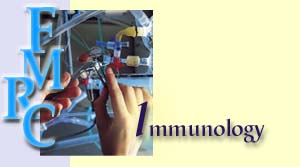- Cellular and Vascular Immunology
- Endocrine Immunology
- Inflammation Research
- Molecular Immunology
- Physiopathology of Joints and Inflammation Research
- Novel GRP78 targeting peptides for the treatment of ischemic diseases.
- Novel peptide binding cell surface endothelial cell induction of angiogenesis.
- Novel peptide binding GRP78 for prevention of hypoxia induced apoptosis in cardiomyocytes.
- Novel GRP78 binding peptides for Inhibition of apoptosis in neuronal cells.
- The molecular mechanism and signal transduction induced by novel GRP78 binding Peptides.
- The significance of cell surface GRP78 on tumor cells
- Stress protein GRP78 expression in colorectal cancer; Metastatic potential of colorectal tumor cells expressing cell surface heat shock protein GRP78.
- Clinical study on GRP78 in colorectal cancer patients
- Breast cancer receptors in correlation to cell surface GRP78 expression
- Clinical study on GRP78 in breast cancer patients
- Drug induced GRP78 expression.
- GRP78 expression on cells from human parotid glands; normal and malignant
- Raiter A, Bechor Z, Kleiman M, Leshem-Lev D, Battler A, Hardy B, Angiogenic peptides improve blood flow and promote capillary growth in a diabetic and ischemic mouse model. Euro. J. Vasc. & Endovasc. Surg, 40: 381-388, 2010 MEDLINE
- Hardy B, Raiter A. Peptide binding heat shock protein GRP78 protects cardiomyocytes from hypoxia induced apoptosis J. Mol. Med. 88: 1157-1167, 2010. MEDLINE
- Glaser-Gabay L, Raiter, A. Battler A, Hardy B. Endothelial cell surface vimentin binding peptide induces angiogenesis under hypoxic/ischemic conditions. Microvascular Research 82(3):221-6. 201.1 MEDLINE
- Goldenberg-Cohen N, Raiter A, Gaydar V, Dratviman-Storobinsky O, Goldstein T, Weizman A, Hardy B .Peptide-binding heat shock protein GRP78 protects neurons from hypoxia-induced apoptosis. Apoptosis. 17 (3) 278-288, 2012. MEDLINE
- Hardy B, Raiter A, Yakimov M, Wilkin A, Niv Y. Colon cancer cells expressing cell surface GRP78 as a marker for reduced tumorigenicity. Cellular Oncology 35(5):345-54, 2012. MEDLINE

Immunology Research Groups
All Research Groups
All Research Groups
Laboratory of Cellular and Vascular Immunology
Head of Laboratory: Prof. Britta Hardy, Ph.D.
Head of Research Group:Annat Raiter Ph.D.
| Tel/Fax: | 972-3-9376782 | |
| Cell: | 972-7527482 | |
| E-mail: | bhardy@post.tau.ac.il |
Research Topics
Selected Publications: